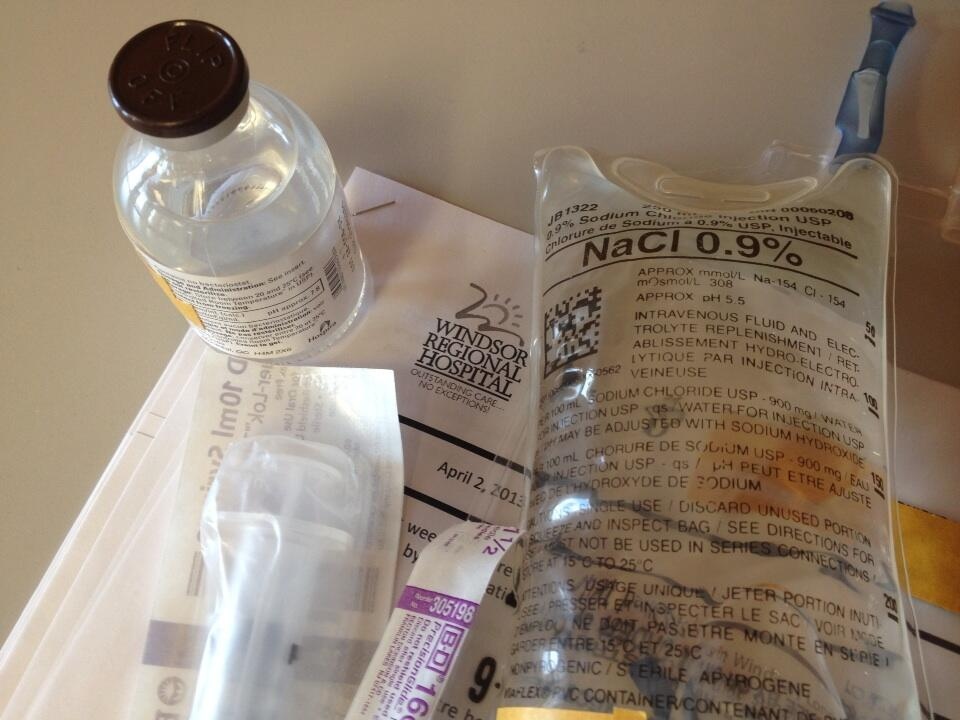The discovery that some hospitals in Ontario and New Brunswick were unknowingly using watered-down chemotherapy drugs has not only led to worry and anger among patients, it’s also prompted plans for lawsuits.
Three firms have announced they hope to launch class-action lawsuits on behalf of the families of the more than 1,100 patients affected. They plan to sue the company that prepared the IV bags containing the diluted medications.
Four hospitals in Ontario and one in New Brunswick purchased batches of IV bags containing cyclophosphamide and gemcitabine that were mistakenly diluted by as much as 20 per cent. Patients received the diluted drugs for more than a year before a lab technician in Peterborough, Ont. spotted the problem.
Ontario announced Thursday it will appoint an independent third party to investigate the error. Premier Kathleen Wynne said the probe will aim to figure out what happened and to understand whether "something systematic" needs to be addressed to prevent it from happening again.
Lawyer Matt Baer, whose firm Siskinds LLP is among the three that are planning lawsuits, says notices of action were filed Wednesday and that phones at his office have been “ringing off the hook” ever since.
“People are very concerned, they’re confused, they’re upset. They don’t know the impacts on their health,” he told CTV’s Canada AM from London, Ont. Thursday.
Baer says the aim of the lawsuit would be to compensate patients for any damage they might have experienced to their health, as well as for emotional distress.
In a statement Wednesday, Siskinds LLP said: "We believe that through this class action, the defendant will be required to account for the problem with these drugs, explain to Canadian patients how this problem occurred, and compensate those affected.
The firms are preparing to sue Mezentco Inc., which operates Marchese Health Care. According to the hospitals, Marchese made a critical error when mixing medication into the IV bags.
They allege that the company didn’t account for the fact that the IV bags they used came overfilled and so when the medication was added to the bags, the dosage was incorrect.
On Wednesday, Marchese defended itself, issuing a public statement to say they were confident they met all of their contract requirements, including concentrations for the IV products.
“These concerns have arisen as a result of a difference between the manner of administration used in some hospitals that was not aligned with how the standardized preparation had been contractually specified,” the company explained.
On Thursday, the company said they are cooperating fully with the government-led investigation.
"Given the early stage of the review it is not appropriate to comment further," they said.
Baer believes a lawsuit can help uncover exactly what went wrong.
“We’re in early stages and these are simply allegations at this point. Obviously, something went wrong somewhere, and we have to go through the steps to determine the proper accountability,” he said.
If the lawsuit can uncover concrete evidence of how the errors directly affected the health of patients, they will seek monetary compensation. But he says patients could also be compensated for the stress they’ve endured worrying about whether they were fully treated.
“It’s difficult enough going through cancer and chemotherapy and then to have a bombshell like this dropped on you, it’s very emotional and this is a very fragile population,” he said.
Tracey Bridgen would agree. She was recently treated for non-Hodgkins lymphoma at Windsor Regional Hospital and was one of the patients who was informed this week that she received the diluted medications.
She says her head began spinning when she got the news and is now feeling stressed and angry.
“This is unacceptable,” Bridgen told CTV Windsor. “And it’s affecting people in ways that you don’t even know unless you are a cancer patient.”
The lawsuit will take time, Baer says. The first step is a certification hearing, in which the firms will try to convince the court that the lawsuit has merit and is appropriate as a class action.
If the suit is approved, every patient who was affected by the error would automatically be included.
Meanwhile, the Ontario College of Pharmacists was at Marchese Hospital Solutions Wednesday to investigate, Ontario Health Minister Deb Matthews said. As well, Cancer Care Ontario and the affected hospitals are conducting their own investigations.
Cancer Care Ontario has said the dilution problem will affect each patient differently, as the dilution ranged between three and 20 per cent, from bag to bag. As well, each patient had a different care plan, relying on different combinations of drugs.




































